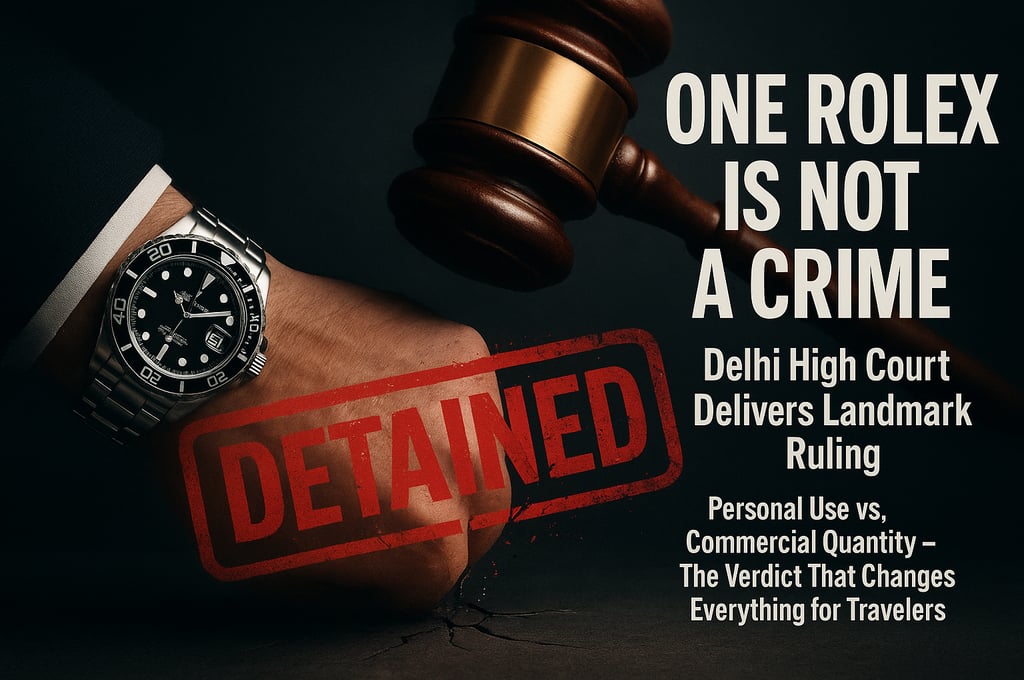One Rolex Watch is Not a Crime: Delhi High Court's Scathing Rebuke to Customs Over 'Commercial Quantity' Blunder
Delhi High Court slams Customs for seizing a single Rolex, ruling it's for personal use, not commercial quantity. Analysis of the landmark Mahesh Malkani case and its impact on passenger rights.
Adv Nadeem Saifi | Partner | Altius Astra Attorneys
9/23/20253 min read


Imagine landing in your home country, wearing your own luxury watch, only to have it seized by customs. The reason? Officials claim a single timepiece is a "commercial quantity." This isn't a plot from a movie; it's exactly what happened to Mahesh Malkani. But in a significant ruling, the Delhi High Court just delivered a powerful message: common sense must prevail at our borders.
In a judgment that clarifies the line between personal use and commercial import, a division bench firmly stated that one Rolex watch cannot be deemed a commercial quantity. This decision isn't just a win for one traveler; it's a crucial precedent for every passenger carrying high-value personal items into India.
The Case That Exposed a Glaring Error: Mahesh Malkani vs. Commissioner of Customs
The facts are straightforward. In March 2024, Mahesh Malkani, an Indian national residing in Dubai, flew into Delhi's Indira Gandhi International Airport. He was wearing a Rolex watch (Model No. 126610LV). Customs authorities detained the watch, alleging he failed to declare it. The subsequent Order-in-Original allowed him to redeem the watch for re-export upon paying a hefty fine of ₹1,80,000 and a penalty of ₹1,50,000.
However, buried in the customs order was a line that caught the High Court's attention—and ire. The adjudicating authority had justified the confiscation by asserting the watch was "clearly in commercial quantity and cannot possibly be for personal use."
The court's response? A simple, logical, and scathing rebuttal.
"Clearly, One Rolex Watch Cannot Be Held to Be a Commercial Quantity"
The Delhi High Court, comprising Justices Prathiba M. Singh and Shail Jain, didn't mince words. The bench identified a fundamental error in the customs authority's reasoning. Their observation cuts to the heart of the matter:
“Clearly, this Court is of the view that one Rolex watch cannot be held to be a commercial quantity and there is no reason as to why the same cannot be kept for personal use.”
This statement is a masterclass in applying logical interpretation to customs law. The very definition of "commercial quantity" implies a volume meant for trade, sale, or business. A solitary watch, especially one being worn, is the very epitome of personal use. The court's ruling reinforces that the value of an item does not automatically transform its character from personal to commercial.
Beyond the Fine Print: What This Ruling Means for You
This Delhi High Court customs ruling has implications that extend far beyond Mr. Malkani's wrist.
A Check on Arbitrary Power: The court specifically "cautioned" the adjudicating authority to ensure such errors don't recur. This serves as a direct warning to officials to apply the law rationally, not mechanically. It empowers passengers who may be unfairly targeted.
Clarity on Personal Use vs. Commercial Import: The judgment provides much-needed clarity. Whether it's a single luxury watch, a high-end handbag, or a piece of jewelry, the principle remains: quantity and circumstance are key determinants. This protects genuine passengers from overreach.
The Question of Declaration: While the court focused on the "commercial quantity" error, the case still underscores the importance of following declaration rules for high-value items. The initial detention was for "non-declaration." The key takeaway? When in doubt, declare. The ruling protects you from disproportionate punishment, but compliance is still your first defense.
A Precedent for Personal Liberty or a Loophole for Misuse?
Could this ruling be misinterpreted? Critics might argue it could encourage non-declaration of ultra-high-value single items, with individuals claiming personal use. However, the court's decision doesn't invalidate declaration requirements or the duty to pay applicable duties. It simply prevents the authorities from using the draconian "commercial quantity" argument for a single item. The power to assess and levy duties on undeclared high-value personal effects remains intact; it just can't be disguised as a seizure of commercial goods.
The Mahesh Malkani case is more than a legal victory for one man. It's a reaffirmation that laws should be interpreted with a dose of everyday logic. The Delhi High Court has effectively ruled that owning a luxury item is not a crime and that the state's power to confiscate must be exercised with discernment.
This judgment should prompt a review of training within customs departments to prevent such "errors" from happening in the first place. After all, shouldn't the law protect the ordinary citizen from unreasonable actions, rather than becoming a tool for them?
What do you think? Does this judgment strike the right balance between enforcing customs laws and protecting passenger rights? Share your views in the comments.
Altius Astra Attorneys
A premier law firm based in Delhi, India, offering legal representation across various practice areas for citizens rights and interests.
© 2025. Altius Astra Attorneys. All rights reserved.
Contact Us
📞 9899290789, 9818786756
📧 contact@altiusastra.com
3C-ED Block, Madhuban Chowk, Pitampura, Delhi-110034
DISCLAIMER
